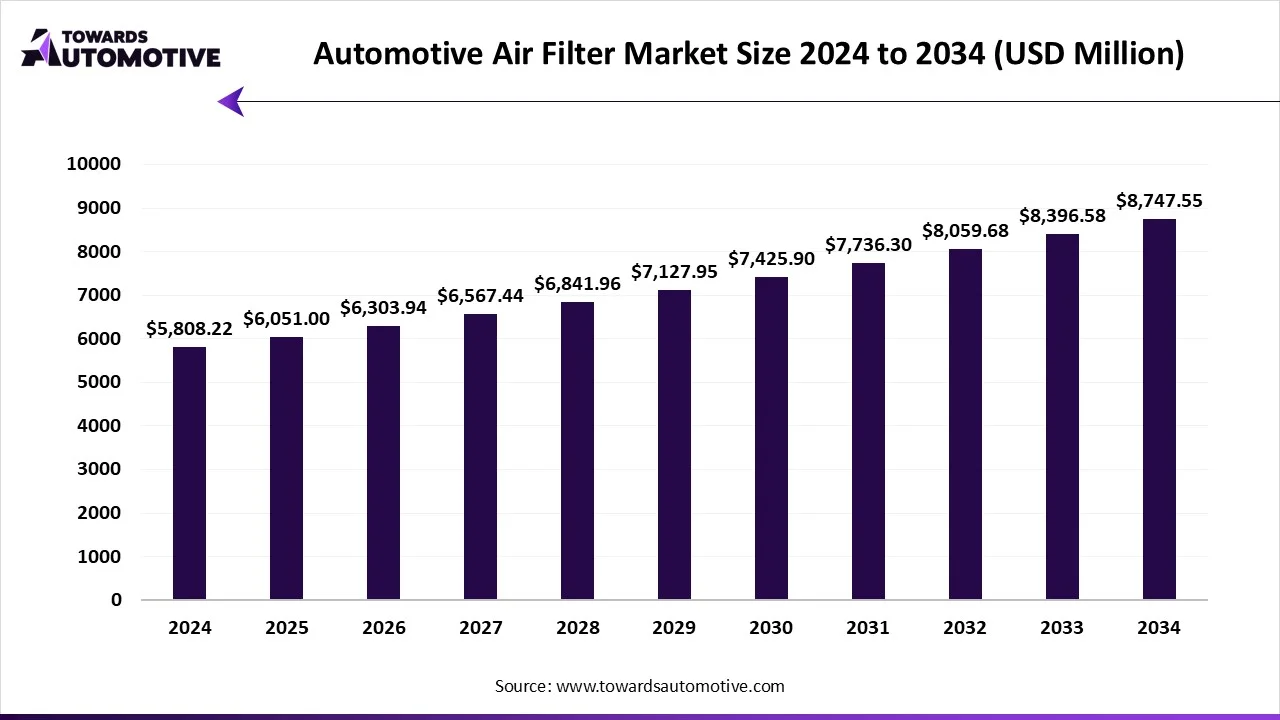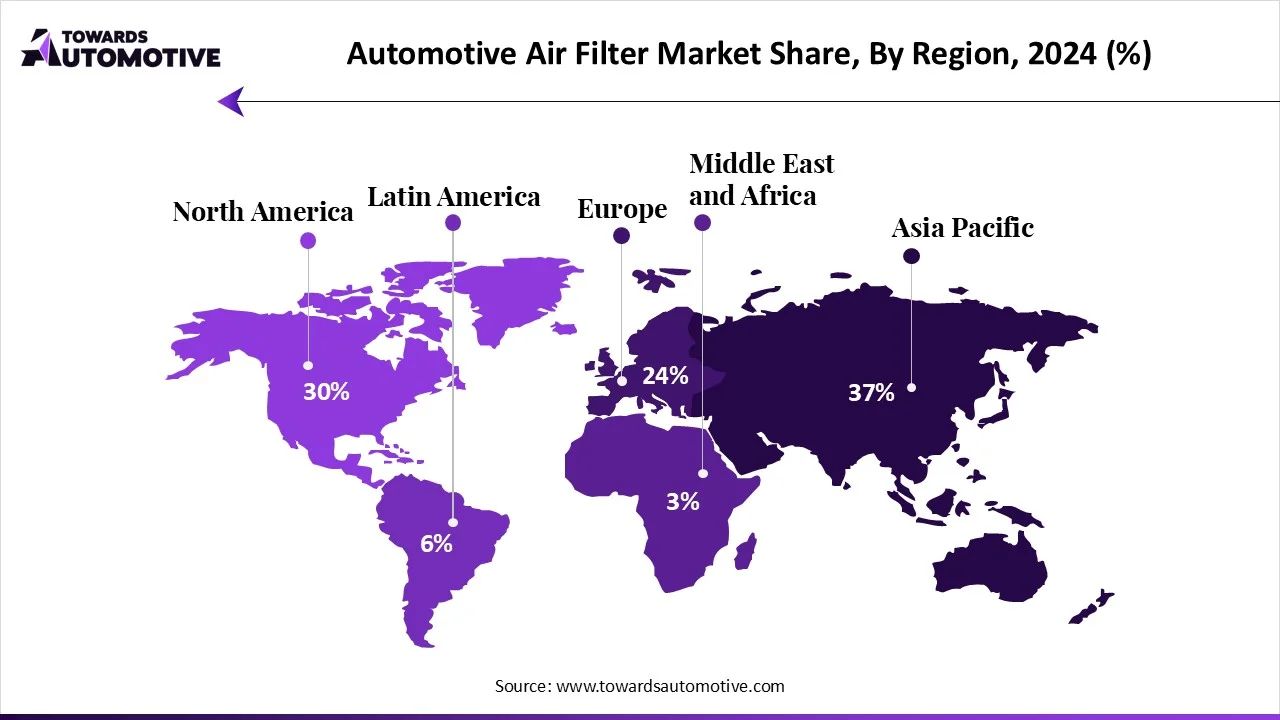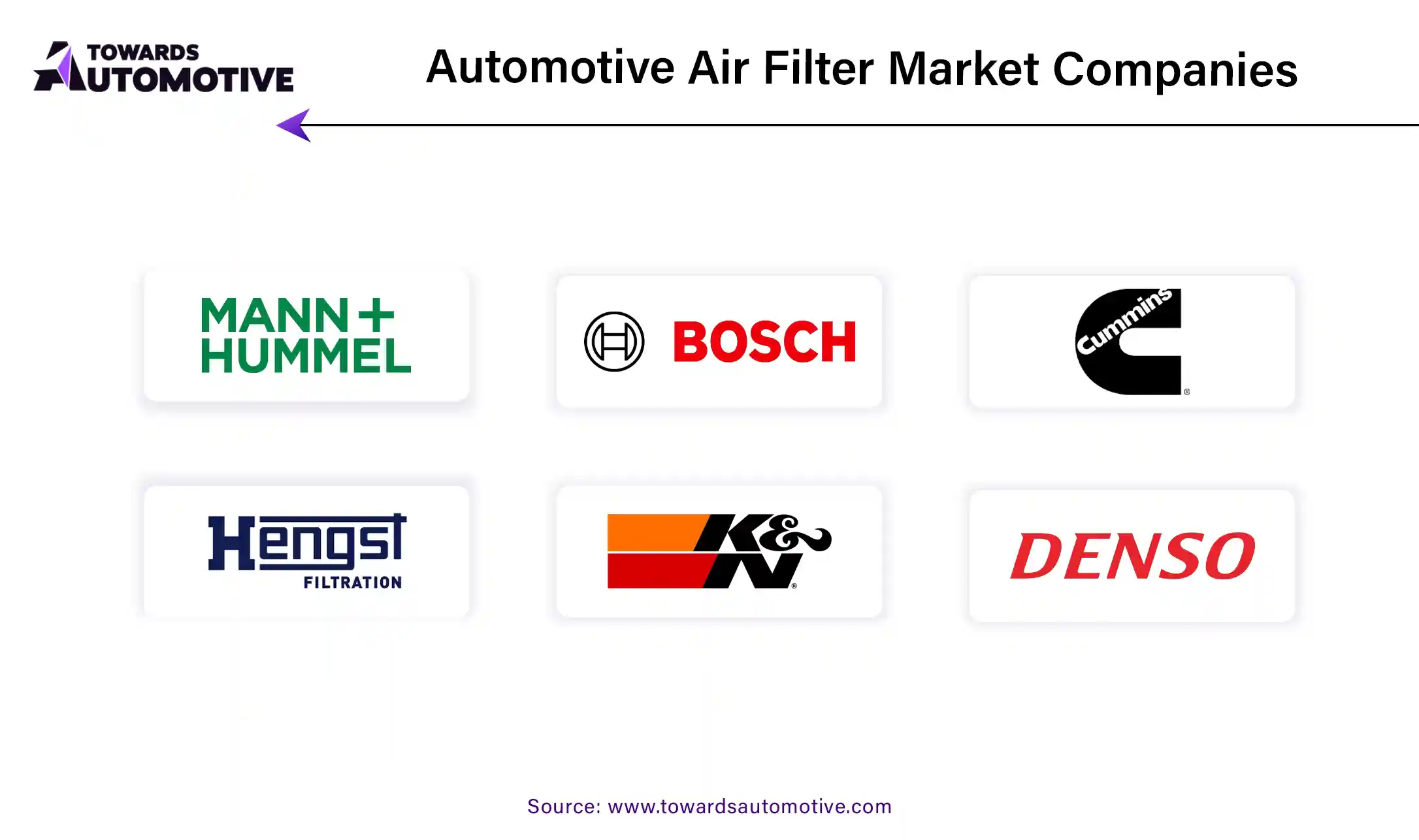September 2025
The automotive air filter market is predicted to expand from USD 6,051.00 million in 2025 to USD 8,747.55 million by 2034, growing at a CAGR of 4.18% during the forecast period from 2025 to 2034.The market growth is driven by technological advancements in air filter technology, increasing vehicular emissions, and rapid expansion of the automotive industry.

Unlock Infinite Advantages: Subscribe to Annual Membership
The automotive air filters market is a critical segment of the automotive industry, focusing on enhancing vehicle performance, fuel efficiency, and passenger health. Air filters play a vital role in maintaining engine efficiency by preventing contaminants such as dust, dirt, and debris from entering the engine. As vehicle manufacturers increasingly prioritize performance and sustainability, the demand for high-quality air filters has surged rapidly. Additionally, rising environmental concerns and stricter emission regulations are driving the need for efficient filtration solutions in the automotive sector.
Technological advancements have led to the development of innovative air filter materials, such as synthetic and electrostatic filters, which offer superior filtration capabilities and longer service life compared to traditional paper filters. The growing popularity of electric and hybrid vehicles is also shaping the market, as these vehicles often require specialized air filtration systems to optimize their performance.
| Metric | Details |
| Market Size in 2024 | USD 5,808.22 Million |
| Projected Market Size in 2034 | USD 8,747.55 Million |
| CAGR (2025 - 2034) | 4.18% |
| Leading Region | Asia Pacific |
| Market Segmentation | By Product Type, By Vehicle, By End Use and By Region |
| Top Key Players | K&N Engineering, Inc., Cummins Inc, Robert Bosch GmbH, Donaldson Company |
Performance air filters are significant driver of growth in the market primarily due to their ability to enhance engine performance and fuel efficiency. Performance air filters are designed to provide superior airflow, better combustion and improved engine response. As consumers become more performance-conscious, the demand for high-quality aftermarket performance air filters is rising at a rapid pace. These filters are often manufactured from advanced materials, such as cotton gauze or synthetic fibers thar offer better filtration efficiency and longevity compared to traditional paper filters.
Nanofiber and electrostatic filters are creating significant opportunities in the automotive air filter market due to their enhanced filtration capabilities and efficiency. Nanofiber filters use ultra-fine fibers to capture microscopic particles and provides superior filtration without restricting airflow in engines. Similarly, electrostatic filters utilize an electrical charge to attract and trap particles, offering high filtration efficiency for both engine and cabin air filters. The demand for cleaner and efficient air filtration systems is also rising with the growing focus on improving in-vehicle air quality.
Governments worldwide are implementing policies to reduce automotive emissions. The policies include promotion of Electric Vehicles (EVs) adoption, strict vehicle emission standards, Pollution Under Control (PUC) programs, and some others. These policies aim to minimize harmful pollutants released into the atmosphere by vehicles, improving air quality and protecting public health. The pollutants emitted by the vehicles are controlled by air filters therefore automakers incorporate high-quality air filters to reduce vehicle emissions.
Automotive Air Filter Market Size, By Product Type, (USD Million)
| 2024 | 2025 | 2026 | 2027 | 2028 | 2029 | 2030 | 2031 | 2032 | 2033 | 2034 | |
| Cabin Filters | 3,368.77 | 3,533.78 | 3,706.72 | 3,887.92 | 4,077.81 | 4,276.77 | 4,485.24 | 4,703.67 | 4,932.52 | 5,172.29 | 5,423.48 |
| Intake Filters | 2,439.45 | 2,517.22 | 2,597.22 | 2,679.52 | 2,764.15 | 2,851.18 | 2,940.66 | 3,032.63 | 3,127.16 | 3,224.29 | 3,324.07 |
The cabin air filter segment is dominating the automotive air filter market. Cabin air filters are crucial as they purify the air inside the vehicle by removing contaminants such as dust, pollen, and other allergens before they enter the cabin. These filters can also help to reduce symptoms of allergies or respiratory conditions. For instance, in June 2024, Uno Minda launched advanced cabin air filters to provide clean and breathable air in automotives.
The air intake filters segment is experiencing significant growth in the automotive air filters market. Air intake filters play a crucial role in driving market growth by ensuring that engines receive clean, filtered air for delivering optimal performance. These filters are designed to prevent harmful contaminants from entering the engine. By maintaining a clean airflow, air intake filters help to improve engine longevity, reduce emissions, and enhance fuel efficiency in vehicles.
The passenger car segment held a dominant share of the market. Passenger vehicles significantly drive the growth of the automotive air filters market due to their sheer volume in global vehicle production and sales. As the most common form of personal transportation, passenger cars require regular maintenance and air filters are a critical component in ensuring vehicle efficiency and longevity that in turn increases the demand for air filters, thereby driving the market expansion. The need for clean air intake to optimize engine performance and improve fuel efficiency is particularly important for passenger cars, where consumers prioritize reliability and lower emissions.
The commercial vehicles segment is experiencing significant growth due to the growing industrialization and the increased use of commercial vehicles for transportation, logistics, food, and goods delivery. The increasing demand for commercial vehicles in the construction and mining sectors is one of the important driver of this industry. Moreover, government initiatives such as promotion of domestic manufacturing and tax benefits over the usage of electric commercial vehicles is boosting the market growth.
The aftermarket segment is dominating the industry. The aftermarket sector plays a pivotal role in driving the growth of the automotive air filters market by offering replacement and upgraded air filters to consumers from various online sectors and offline sectors. As air filters in vehicles require periodic replacement to maintain optimal performance, the aftermarket provides a significant opportunity for continued sales and revenue in the industry.
The OEMs segment is expected to grow significantly over the forecast period due to the rapid expansion of the automotive industry, technological advancements, and increasing demand for energy-efficient transportation. OEM components contribute to global economic expansion as automakers invest heavily in air filtration technologies.
Automotive Air Filter Market Size, By Region, (USD Million)
| 2024 | 2025 | 2026 | 2027 | 2028 | 2029 | 2030 | 2031 | 2032 | 2033 | 2034 | |
| Asia-Pacific | 2,671.78 | 2,795.56 | 2,925.03 | 3,060.43 | 3,202.05 | 3,350.13 | 3,505.03 | 3,667.00 | 3,836.40 | 4,013.57 | 4,198.82 |
| Europe | 1,277.81 | 1,325.17 | 1,374.26 | 1,425.13 | 1,477.86 | 1,532.51 | 1,589.14 | 1,647.83 | 1,708.65 | 1,771.68 | 1,836.99 |
| Latin America | 348.49 | 366.09 | 384.54 | 403.90 | 424.20 | 445.50 | 467.83 | 491.26 | 515.82 | 541.58 | 568.59 |
| Middle East & Africa | 290.41 | 299.52 | 308.89 | 318.52 | 328.41 | 338.58 | 349.02 | 359.74 | 370.75 | 382.04 | 393.64 |
| North America | 1,219.73 | 1,264.66 | 1,311.22 | 1,359.46 | 1,409.44 | 1,461.23 | 1,514.88 | 1,570.47 | 1,628.06 | 1,687.71 | 1,749.51 |
Asia Pacific dominated the automotive air filter market due to the rapid expansion of the automotive industry, collaboration among market players, the growing adoption of electric vehicles (EVs), and stringent government regulations on emissions. APAC countries, particularly China, India, and Japan, are witnessing a surge in vehicle production and sales. This rise in automotive demand is directly driving the need for high-quality air filters to ensure efficient engine performance and cleaner cabin environments in both passenger and commercial vehicles.

The growing adoption of EVs across the region is shaping the automotive air filters market. While EVs do not require traditional engine air filters, the demand for advanced cabin air filters is increasing as these vehicles prioritize passenger comfort and air quality. EV manufacturers are integrating sophisticated filtration systems to cater to the rising consumer expectations for clean and safe air inside vehicles, particularly in highly polluted urban areas.
Furthermore, government regulations on emissions are playing a pivotal role in market growth. Countries in the region are implementing stricter emission standards to combat air pollution and reduce vehicular emissions. This has created a strong demand for advanced air filtration systems that can capture finer particles and help to meet these regulatory requirements. These factors collectively create robust growth opportunities for both original equipment manufacturers (OEMs) and the aftermarket sector in APAC's automotive air filters market.
China held a significant share of the market in this region due to rise in vehicle production, EV adoption, technologically strong automotive infrastructure, and government support. China is the largest consumer as well as exporter of automotive air filter industry. India, Japan, and South Korea are the important export destinations of China. Fonho, He Bei Xue Yuan Filter Co., Ltd. and Ayido Industry, and BMC Air Filters are some key Chinese automotive air filter companies.
The Indian automotive air filter market is experiencing growth, driven by rising vehicle production, increasing consumer awareness about maintenance, and stricter environmental regulations. The growth is also caused by increasing usage of passenger and light commercial vehicles. China, Japan, and South Korea are the major export destinations of India.
North America is expected to grow with a significant CAGR during the forecast period. The growth of the market in North America is significantly driven by the presence of major automotive companies, growing consumer awareness, and the increasing trend of sports cars. North America, particularly the U.S. and Canada, is home to some of the world's largest automotive manufacturers such as General Motors, Ford, and Tesla. These companies are continuously investing in innovation and technology, creating a steady demand for advanced air filters to enhance both engine efficiency and cabin air quality. The strong automotive production base in the region fuels consistent demand for automotive components, including air filters.
Another crucial factor is the growing consumer awareness regarding air quality and vehicle maintenance. Consumers are becoming more conscious about the need for cleaner air in their vehicles, due to rising concerns about pollution and allergens. This heightened awareness is driving the demand for more effective cabin air filters that can protect passengers from dust, pollen, and other pollutants, thereby ensuring a safer and more comfortable driving experience.
Additionally, the increasing trend of sports cars in North America is contributing to market growth. Sports cars often demand high-performance components, including air filters and oil filters that optimize engine performance. These vehicles require superior filtration systems to maintain engine power and efficiency, especially during high-speed driving. As the popularity of sports cars grows, the demand for specialized air filters is growing at a rapid pace in this region.
The automotive air filter market in U.S. is primarily driven by a strong aftermarket demand, focus on enhancing vehicle efficiency, and routine maintenance. The U.S. is the largest exporter of air filters in North America that exports their maximum products to Mexico and Canada. Cummins, K&N Engineering, Donaldson, and ACDelco are some of the prominent automotive air filter companies in the U.S.

Key companies worldwide are focusing on launching new products and cost-reduction to improve product quality. Some of the companies in the automotive air filter market are K&N Engineering, Inc., Cummins Inc, Robert Bosch GmbH, Donaldson Company, Ahlstrom Corporation, Parker Hannifin Corporation, Mahle GmbH, Denso Corporation, Neenah Paper Inc, SOGEFI Group, Lydall Inc, Valeo SA, Hengst SE, Clarcor, Inc, Toyota Boshoku Corporation, Freudenberg & Co.KG, Hollingsworth & Vose Co. Inc, Mann+Hummel GmbH, Roki Co., Ltd, ACDelco Inc, and others.
Mann+Hummel launched Mann-Filter Frecious Plus in August 2024 featuring nanofibers for cabin air filtration. This new filter is designed for providing protection against allergens, bacteria, and molds.
By Product Type
By Vehicle
By End Use
By Region
September 2025
September 2025
August 2025
August 2025
We offer automotive expertise for market projections and customizable research, adaptable to diverse strategic approaches.
Contact Us